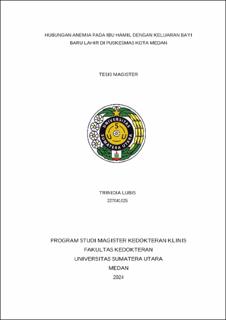| dc.description.abstract | Background: Anemia in pregnant women is a common condition, especially in developing countries, and has the potential to cause various perinatal complications. More than two-thirds of pregnant women in developing countries suffer from anemia, with the majority of cases caused by iron deficiency anemia. This study aims to evaluate the relationship between anemia in pregnant women and newborn outcomes, including low birth weight (LBW), premature birth, and the need for neonatal intensive care unit (NICU) treatment.
Methods: This research is an observational study with a cross-sectional design involving pregnant women who had their pregnancies checked at 35 community health centers in Medan City and recorded having given birth in the period of July-December 2023. The data were analyzed descriptively to observe the frequency distribution of the study subjects based on sample characteristics. Bivariate analysis was performed using the chi-square test to assess the relationship between maternal anemia and perinatal outcomes in the form of low birth weight, premature birth, and the need for NICU treatment. The analysis results were considered significant if p < 0.05 with a 95% confidence level.
Results: This study showed that the majority of anemic mothers were aged 20-35 years, with 208 pregnant women (46.2%) and had a multiparous status (28.4%). Anemic mothers were also noted to have a frequency of antenatal care below six times, totaling 175 times (38.9%). The study found that out of 450 newborns, 43 babies of anemic mothers required NICU care compared to 5 babies of non-anemic mothers. Additionally, low birth weight was experienced by 38 babies born to anemic mothers, while only 9 babies had low birth weight born to non-anemic mothers. The study found 59 premature babies born to anemic mothers, while only 12 premature babies were born to non-anemic mothers. The chi-square test showed a significant relationship with p < 0.001 for all three perinatal outcomes studied in this research.
Conclusion: Anemia in pregnant women has a significant impact on poor perinatal outcomes, including an increased risk of low birth weight, premature birth, and the need for NICU care. The results of this study support the importance of managing and preventing anemia during pregnancy to improve the quality of birth outcomes and the health of newborns. | en_US |


